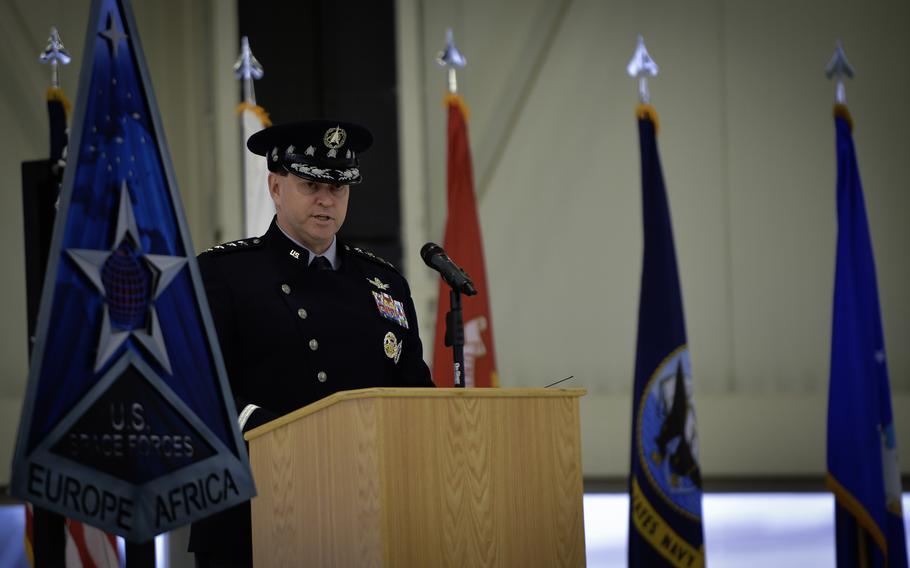
Gen. Chance Saltzman, chief of space operations for the U.S. Space Force, delivers a keynote address to military leaders, local government officials and unit members, Dec. 8, 2023, during the activation ceremony of the new U.S. Space Forces Europe and Africa component command at Ramstein Air Base, Germany. (Alexander Riedel/Stars and Stripes)
RAMSTEIN AIR BASE, Germany — A dark-blue flag with a nod to the stars was unfurled Friday to mark the activation of U.S. Space Forces’ first component command based in Europe, underscoring the growing importance of space-based communications in modern warfare and defense.
U.S. Space Forces Europe-Africa will work for U.S. commands based in Europe and Africa rather than Space Force interests stateside, Gen. Chance Saltzman, chief of space operations, said at the activation ceremony.
The new unit’s leader, Col. Max Lantz, will report to the four-star generals heading U.S. European and African commands.
“This regional focus is going to give a level of integration we haven’t had in the past,” Saltzman said.
A primary focus will be protecting the information flow from space, Saltzman said, which may take “the form of deliberate interference with satellite communications … and other services that we come to rely on,” both in civilian life and in military operations.
Russia’s war in Ukraine is proof of the importance of that mission in Europe, Air Force Lt. Gen. Steven Basham, EUCOM deputy commander, told reporters Friday.
Intelligence, surveillance and reconnaissance through space allowed Ukraine and its partners to quickly discount the disinformation Russia spread in the early days of the war with “actual time-stamped, factual footage and images,” Basham said.
Lantz added that the war put a fine point on how much the commercial space industry has progressed in a very short time.
As an example, he mentioned Starlink, a satellite service owned by Elon Musk that replaced internet and communication networks destroyed during the war.
“Starlink has been a game-changer for Ukraine,” he said.
Space Forces Europe-Africa’s work is expected to contribute to the collective efforts of NATO allies and other partners on both continents.
Lantz described the unit’s “seat at the table” as a critical part of building relationships with other countries.
“More than any other domain, security in the space domain requires like-minded nations working together side by side,” he said.
The unit will start with about 30 guardians, Lantz told reporters before the ceremony. For now, there’s no net gain or need for interservice transfers, as members were already part of U.S. Air Forces in Europe Air Forces Africa and stationed at Ramstein.
“USAFE allowed us to take their space experts, consolidate them and start to build … the space team,” Lantz said.
The team is poised to grow and will likely expand to EUCOM and AFRICOM headquarters in Stuttgart so that guardians can “be part of meetings and sessions that go down there, to link back to the support staff here,” he said.
“This is the first day,” Lantz told reporters. “We’ve got some work to do to really understand how to prepare to support (the commands) with a full-up established headquarters staff … that will be more than 30 people, I can guarantee that.”
Europe and Africa, Saltzman added, rely on information provided by civil, commercial and military satellites flown from the United States.
The new component’s guardians know the systems and understand how to work with U.S.-based space officials to ensure that the right information gets to the combatant commanders “so we can get the most out of those capabilities,” Saltzman said.
Space Forces Europe-Africa became the fourth component for a regional combatant command since the service was established in December 2019 as the sixth branch of the armed forces.
It joins Space Forces Indo-Pacific, with headquarters in Hawaii; Space Forces Korea at Osan Air Base; and Space Forces Central in Tampa, Fla., which supports U.S. Central Command.